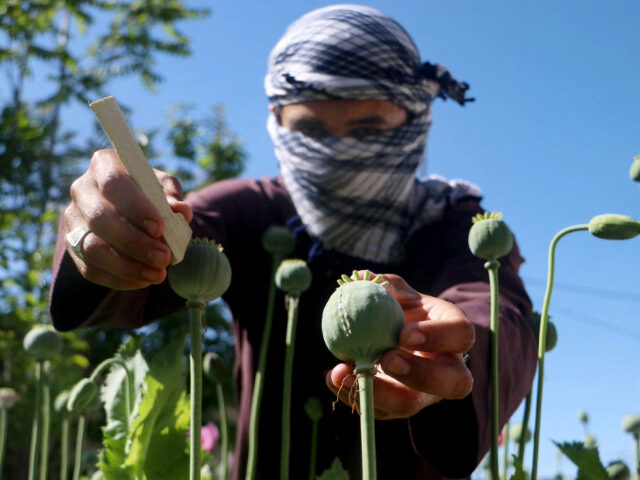The United Nations Office on Drugs and Crime (UNODC) warned in its annual World Drug Report on Wednesday that the Taliban junta in Afghanistan could increase overdose deaths by ordering a dramatic reduction in opium production because heroin users hit by the sudden loss of supply could turn to even more dangerous synthetics for their fixes.
The U.N. found that opium production in Afghanistan fell by 95 percent after the Taliban banned harvesting the poppies in 2022. The report found production from Myanmar increased by 35 percent during the same period, but it was not nearly enough to cover the shortage of product from Afghanistan, bringing the worldwide heroin supply down by roughly 75 percent. Afghanistan was by far the world’s top producer of opium until 2022, accounting for some 80 percent of the global supply.
The Taliban was a major profiteer from the opium trade during its years of insurgency against the U.S.-supported elected government of Afghanistan, but, in one of its rare efforts to curry a bit of favor with the international community after seizing power in 2021, the Islamist terrorist junta announced that harvesting the poppies was no longer consistent with its interpretation of Sharia, and anyone who did so would face severe penalties.
Taliban Supreme Leader Haibatullah Akhunzada warned in April 2022 that if any of his subjects violated his new decree against opium, “the crop will be destroyed immediately and the violator will be treated according to the Sharia law.”
The U.N. and other agencies, including the U.S. government, had long hoped to choke off the flood of heroin pouring out of Afghanistan by persuading Afghan farmers to grow other crops. The Taliban’s iron-fisted solution to the problem immediately caused a problem they had long feared: shutting down Afghanistan’s billion-dollar drug trade by decree caused enormous hardships for farmers who suddenly had no way to earn a living.
The UNODC was cautiously optimistic about the opium ban at first, but, soon, human rights organizations complained about soaring poverty rates among the onetime champion poppy harvesters of southern Afghanistan. The Taliban was neither interested nor capable of doing much to help the impoverished farmers, and the rest of the world could not finance or implement an enormous transition program to new crops while the Taliban ruled in Kabul.
In its report on Wednesday, the UNODC warned that opium supplies were beginning to contract around the world, and the supply would plunge even more dramatically over the coming year as drug stockpiles were depleted. According to the report, the speed of the transformation was harming heroin users as well as Afghan farmers.
“The purity of heroin on the market is expected to decline,” the UNODC said. “Demand for opiate treatment services, including for methadone, buprenorphine, and slow-release morphine treatment, may rise, but if these services are insufficient, heroin users may switch to other opioids:”
Such a switch may pose significant risks to health and lead to an increase in overdoses, especially if the alternative opioids include highly potent substances such as some fentanyl analogues or nitazenes that have already emerged in some European countries in recent years.
Nitazenes are the new synthetic scourge of the drug world, a class of synthetics that can be even more potent and dangerous than fentanyl, which killed more than 100,000 people in the U.S. alone in 2023. Fentanyl is 50 times more powerful than heroin, and nitazenes are even worse.
The Washington Post managed to find a climate change angle to the Taliban’s opium ban, warning that other crops — like eggplants, pomegranates, and apricots — “no longer grow easily” in southern Afghanistan because of climate change.
A Taliban agricultural official told the Washington Post that climate change might force the junta to lift its ban on opium harvesting because farmers can find nothing else to grow. Taliban officials are reportedly testing saffron and pistachios to learn if they can grow in the more “dry and salty conditions” of the former opium fields and are appealing to the international community to supply them with more seeds.

COMMENTS
Please let us know if you're having issues with commenting.